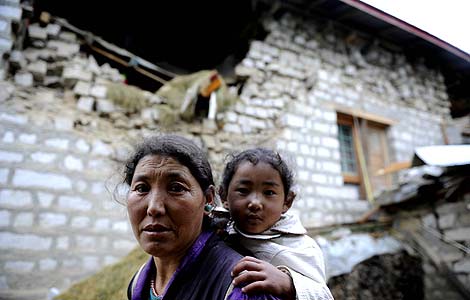Programs to target domestic violence
Updated: 2011-09-21 08:02
By He Dan (China Daily)
|
|||||||||||
|
 Cartoon by Wu Zhiru [http://cartoon.chinadaily.com.cn]
|
In 2010, the federation and its branches nationwide received 52,000 petitions from women who had suffered domestic violence, a figure that accounts for nearly one sixth of all petitions on women's rights the federation received.
In 2009, complaints about domestic violence filed by women to the federation reached 48,000, a rise of 21 percent over the previous year.
Domestic violence has been a social problem in China for a long time, however it is hard to tell whether the problem is getting worse just from the increased number of complaints, said Chen Mingxia, a professor with the Chinese Academy of Social Sciences.
In some degree, the rise in complaints indicates women are becoming more aware of the problem and more of them are refusing to tolerate it, Chen told China Daily after a seminar about tackling domestic violence through a multi-sector approach. The seminar was held in Beijing on Tuesday.
Establishing a joint approach to prevent and respond to domestic violence is urgent and should involve all levels of health, public security and justice departments, said Jiang Yue'e, head of the federation's department for women's rights and interests, who also attended the seminar.
Sponsored by four United Nations agencies, including UN Women, the federation initiated a two-year pilot program based on the multi-sector approach in three counties - Ningxiang in Hunan province, Jingyuan in Gansu province and Yilong in Sichuan province.
In the pilot counties, doctors and nurses, especially those in obstetrics and gynecology departments, will be trained to do screening checkups on female patients and record whether they have experienced any domestic violence, said Zhao Yanxia, an official from the National Center for Women's and Children's Health.
"Doctors and nurses can be the first people victims turn to and they provide medical evidence for those victims," Zhao said. "So it is important that doctors and nurses know how to participate in anti-domestic violence work."
Police and local justice officials in the pilot counties will also receive training in how to provide legal help for victims and how to spread information about gender equality and anti-domestic violence, experts at the seminar said.
"Our experience shows that women and children are usually the victims of domestic violence, while abusers cannot be categorized by personality, age, education or income level. Even celebrities can be abusers," Jiang said.
Recently, well-known English teacher Li Yang confessed and apologized to the public for beating his wife, Kim Lee, about a week after she caught the public's attention by releasing photos of her bruised forehead and bleeding ear through posts on Sina Weibo, China's version of Twitter.
Chen also urged more abused women to tell others about their experiences and to seek help instead of suffering in silence.
About 80 countries have promulgated specific laws to prevent all forms of domestic violence, said Jiang, adding that, in Asia, only West Asian countries and the Chinese mainland have yet to introduce such laws.
Encouragingly, legislation against domestic violence has been listed on the agenda of the Standing Committee of the National People's Congress, Jiang said.
Hot Topics
Organ transplant bonds mother and son
Editor's Picks

|

|

|

|

|

|







